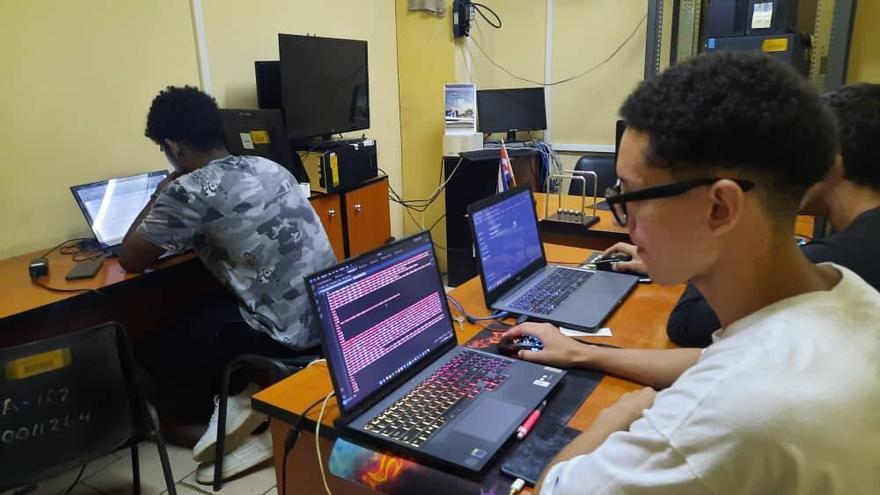
![]() 14ymedio, Havana, January 6, 2024 — The Cuban communications monopoly, Etecsa, revealed this Saturday that its cybersecurity experts recorded 2,600 incidents from January to September 2023, including numerous attacks and “complex intrusions” into banking and government servers, which are characterized by “the use of unauthorized systems and devices to share data that are of a confidential nature.”
14ymedio, Havana, January 6, 2024 — The Cuban communications monopoly, Etecsa, revealed this Saturday that its cybersecurity experts recorded 2,600 incidents from January to September 2023, including numerous attacks and “complex intrusions” into banking and government servers, which are characterized by “the use of unauthorized systems and devices to share data that are of a confidential nature.”
Daniel Ramos, Business Director of Etecsa, said that most of the attacks have to do with “the sending and receiving of spam, malicious traffic generated by malicious codes, service scans and exploitation of vulnerabilities that have compromised websites and other computer elements.”
However, the official said he felt reassured about the future of cybersecurity in the country: a battalion of engineers has been training at the University of Computer Sciences (UCI) for several years, with a course plan that will train them to become the digital elite, with one goal: to make war on “cybercriminals” with a spoonful of their own medicine, Artificial Intelligence (AI), among the other tools used by “criminals,” Ramos said.
“Human error is one of the main causes of cyber incidents in State entities,” Ramos said
“Human error is one of the main causes of cyber incidents in State entities,” Ramos said. The cause: “violations of information security policies by those responsible for computer security and users of these technologies.”
In addition, he pointed out, in “work devices” – computers and the industrial phones of cadres and workers, subsidized by the Government – “weak passwords” are used, and it is common for “staff to visit unsafe websites.”
Some 8.4 million Cubans have an Internet connection, which also makes them vulnerable to threats, Ramos alleged. Some 70% of the cybersecurity “incidents” counted by Etecsa refer to “cyber harassment, identity theft and scams through digital social networks and electronic payment channels” such as Transfermóvil and EnZona, Ramos said.
Etecsa considers cybersecurity as an indispensable condition for the banking process set up by the authorities in August 2023. Without “high levels of security in the technological organizations involved” there will be no banking, the official warned. Ramos also asked for a “permanent update” of the telecommunications laws in Cuba.
The director of Etecsa, who alluded to Cuban servers as victims of “cyber enemies,” did not say a word about the complaints of international cybersecurity companies, which have warned about the intensification, since 2019, of the information manipulation campaigns that several Governments – including that of Cuba – have put at the center of their political agendas.
The proliferation of anonymous profiles, the generation of images and videos with AI and the dissemination of false content are some of the activities that characterize the work of these Internet groups
The proliferation of anonymous profiles, the generation of images and videos with AI and the dissemination of false content are some of the activities that characterize the work of these Internet groups, related to the Island’s regime and the governments of Russia, China, Iran, Mexico, Argentina, El Salvador and, in addition, organizations in Ethiopia, Indonesia and Ecuador, according to the American company Mandiant.
Although Mandiant does not reveal to what extent the Cuban regime is involved in the financing of these groups, its report takes as an example one of the false profiles created by a group related to the Government of Havana. The technique, they say, is the recreation of a digitally altered face so that it looks like the profile of a real person.
For more than a decade, activists have pointed out the ICU as the origin of these campaigns. Even the testimonies of graduates of that center confirm the hypothesis that students, among their teaching tasks, must carry out hacking and denial-of-service attacks on dissident sites, techniques that are now learned professionally, as Ramos explained, in the recent Cybersecurity major of the ICU.
Translated by Regina Anavy
____________
COLLABORATE WITH OUR WORK: The 14ymedio team is committed to practicing serious journalism that reflects Cuba’s reality in all its depth. Thank you for joining us on this long journey. We invite you to continue supporting us by becoming a member of 14ymedio now. Together we can continue transforming journalism in Cuba.
